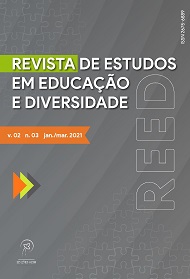OCCUPY AND RESIST: HIGH SCHOOL STUDENTS STRUGGLE FOR SCHOOL TRANSFORMATION
DOI:
https://doi.org/10.22481/reed.v2i3.8114Keywords:
Secondary Student Movement, Daily, Political Participation, School Occupations.Abstract
This work analyzed the transformations of the school space from the high school students’ occupations that occurred in 2016, having as reference the movement of the Federal Institute of Rio Grande do Sul - Campus Pelotas. During the occupation, students created diaries and publications on a social network to inform society about the organization of the movement and, based on these materials, we developed this analysis. In this sense, we understand the occupation movement as a questioner and stressor of daily life and of the structural relations of the school that made possible a transformation of this space. When organizing the occupation movements, students demonstrate a response to the idea that youth is depoliticized and without the ability to articulate. We point to the continuity of the movement since some of the individuals involved developed an awareness of political participation. They have brought questions and the ability to mobilize other social spheres and political actors for actions that generate changes in the dominant structures of society. Finally, we consider the political articulation of the movement to be relevant in the dispute of social thought, through a break with crystallizations of the daily life of the capital order reproduced in the formative institutions of thought.
Downloads
References
ACCORSSI, Aline; NETTO, Livian Lino; CLASE, Julia Rocha. Discurso de ódio acerca do jovem: “chama a BM e desce o sarrafo nesse bando de playboy desocupado”. Tematicas, Campinas, SP, v. 27, n. 54, p. 73–94, 2019. DOI: 10.20396/ Temáticas.v27i54.12339. Disponível em: https://econtents.bc.unicamp.br/inpec/index.php/tematicas/article/view/12339. Acesso em: 22 mar. 2021.
ALVES-MAZZOTTI, Alda Judith; GEWANDSZNAJDER, Fernando. O método nas ciências naturais e sociais: pesquisa quantitativa e qualitativa. São Paulo: Pioneira, 1998.
SILVA, Rosimeri Aquino da. Estudantes Ocupadores: representações ou contra representações de um novo personagem social. In: CATTANI, Antonio David (Org.). Escolas Ocupadas. Cirkula, Porto Alegre, 2017.
GOMES, Romeu. Análise e interpretação de dados de pesquisa qualitativa. In: MINAYO, Maria Cecília de Souza (org.), DESLANDES, Suely Ferreira; GOMES, Romeu. Pesquisa Social: Teoria, método e criatividade. Petrópolis, RJ: Vozes, 2016.
HELLER, Agnes. O cotidiano e a história. Trad.: Carlos Nelson Coutinho e Leandro Konder. 10 ed. São Paulo: Paz e Terra, 2014.
IASI, Mauro Luis. Ensaios sobre a Consciência e a Emancipação. 2 ed. São Paulo: Expressão Popular, 2011.
MARTINS, José de Souza. O senso comum e a vida cotidiana. Tempo Social, 10(1), 1-8, 1988. Disponível em: <https://doi.org/10.1590/ts.v10i1.86696> Acesso em:17 de novembro de 2020.
OCUPA IFSUL. Carta Aberta do Movimento Ocupa IFSul à comunidade acadêmica e à sociedade em geral. Pelotas, outubro, 2016. FACEBOOK: ocupaifpel. Disponível em: <https://www.facebook.com/ocupaifpel/photos/a.1125945747491065/1181195878632718/> Acesso em: 10 de outubro de 2020.
OCUPA IFSUL. Diário da Ocupação. Pelotas, outubro, 2016. FACEBOOK: ocupaifpel. Disponível em: <https://www.facebook.com/ocupaifpel/posts/1128285470590426> Acesso em: 10 de outubro de 2020.
PEREIRA, Alexandre Barbosa. Aprendendo a ser jovem: a escola como espaço de sociabilidade juvenil. In: XIII Congresso Brasileiro de Sociologia, 2007. Recife, Anais [...]. XIII Congresso Brasileiro de Sociologia, 2007.
SANDOVAL, Salvador; SILVA, Alessandro Soares da. O Modelo de Análise da Consciência Política como Contribuição para a Psicologia Política dos Movimentos Sociais. In: HUR, Domenico Uhng; JÚNIOR, Fernando Lacerda (Orgs.). Psicologia, Políticas e Movimentos Sociais. Petrópolis, RJ: Vozes, 2016.
SOUZA, H. J. Como se faz análise de conjuntura. 11 ed. Petrópolis: Vozes, 1991. 54p.
Downloads
Published
How to Cite
Issue
Section
License
You are free to:
Share - copy and redistribute the material in any medium or format; Adapt - remix, transform, and build from the material for any purpose, even commercially. This license is acceptable for Free Cultural Works. The licensor cannot revoke these freedoms as long as you follow the terms of the license.
Under the following terms:
Attribution - You must appropriately give credit, provide a link to the license, and indicate if any changes have been made. You may do so in any reasonable way, but not in a way that suggests that you or your use is endorsed by the licensor.
There are no additional restrictions - You cannot apply legal terms or technological measures that legally restrict others to make any use permitted by the license.












